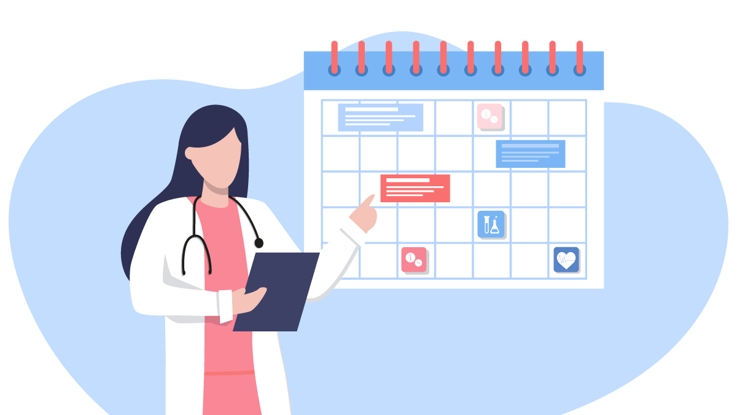8 Tips to Show Your Heart Some Love
- Category: Blog
- Posted On:
- Written By: Northern Inyo Healthcare District
.jpeg)
American Heart Month
During February, American Heart Month is observed as a time to raise awareness and educate the public about the impact of heart disease on individuals and communities. Maintaining a healthy lifestyle is critical to showing your heart some love. Here are eight tips to help you do just that:
1. Get Active.
Regular exercise can decrease the likelihood of heart disease, enhance heart performance, and enhance overall wellness. As a starting point, strive to be physically active for 30 minutes every day, four to five days a week.
Strengthening your heart and improving cardiovascular health can be achieved through aerobic exercises like running, swimming, or cycling. Strength training exercises can help improve heart function and reduce the risk of heart disease.
Alternatively — staying active doesn't have to mean hitting the gym! You can also get physical activity and improve your heart health by walking during lunch, using the stairs instead of the elevator, or even playing with your children or pets.
2. Eat a Healthy Diet.
Eating a healthy diet is a crucial component of heart health. Choosing nutrient-dense, whole foods and limiting processed and high-fat foods can help reduce the risk of heart disease:
- Opt for a diet rich in fruits, vegetables, and whole grains for optimal heart health. These foods are abundant in fiber and essential nutrients that support heart function.
- Include lean proteins like poultry, fish, and legumes in your diet.
- Reduce your consumption of saturated and trans fats, which can negatively impact cholesterol levels.
- Select healthy fats like monounsaturated and polyunsaturated fats instead.
- Limit your intake of added sugars, which can trigger inflammation and increase blood pressure.
- Stay hydrated by drinking plenty of water and limiting your consumption of sugary beverages.
Eating a balanced and nutritious diet is vital in protecting your heart and maintaining overall health. Start incorporating these tips into your daily routine, and you will be on your way to a healthy, heart-friendly diet.
3. Manage Stress.
Stress can have a significant impact on heart health. Chronic stress can raise blood pressure, increase inflammation, and contribute to the development of heart disease.
Follow these ideas to reduce stress and find balance:
- Adopt stress-reducing habits like mindfulness, yoga, and deep breathing.
- Engage in physical exercise regularly, as it has been established to lower stress and enhance overall health.
- Build and maintain social connections. Spending time with loved ones can decrease stress and enhance emotional well-being.
- Limit caffeine and alcohol consumption. Both of these substances can contribute to stress.
- Set boundaries and prioritize self-care for your mental health.
4. Avoid Tobacco & Nicotine.
Exposure to smoke can cause damage to the heart and blood vessels, increase blood pressure, and increase the risk of heart attack and stroke.
If you smoke, quitting is the best thing you can do for your health. Many resources are available to help you stop, including nicotine replacement therapy, prescription medications, and counseling. Talk to your doctor about which options may be best for you.
In addition to quitting smoking, it is crucial to avoid exposure to secondhand smoke. If you live with a smoker, encourage them to quit, and consider making your home and car smoke-free.
5. Control Your Blood Pressure.
A major risk factor for heart disease and stroke is high blood pressure. It is essential to monitor and control your blood pressure to protect your heart and overall health.
On top of eating healthy, exercising regularly, and managing stress, you can maintain healthy blood pressure by monitoring it at home. Doing so can help you track any changes and detect high blood pressure early.
Additionally, it is imperative to take any prescribed medications as directed. If you have been prescribed medication to control your blood pressure, it is important to take it as directed and follow up with your doctor regularly.
6. Limit Alcohol.
Drinking alcohol in excess can increase the risk of high blood pressure, heart disease, and stroke. Keeping your heart and overall health healthy means limiting alcohol consumption.
It would be best if you tried the following:
- Set limits for yourself.
- Drink slowly. Sipping your drink slowly can help you stay within your limits and avoid too much.
- Choose low-alcohol drinks.
- Drink water between drinks.
- Avoid drinking on an empty stomach. Eating before or while drinking can help slow the absorption of alcohol.
- Be mindful of triggers. Identify situations or events that may lead you to drink more than you intended and plan to avoid or manage these triggers.
By adhering to these guidelines and moderating your alcohol consumption, you can decrease your chances of developing heart disease and enhance your overall well-being. And remember, drink responsibly and never operate a vehicle while under the influence.
7. Practice Proper Sleep Hygiene.
Adequate, good-quality sleep is critical for both heart health and general wellness. Poor sleep practices and conditions can raise the likelihood of heart disease, hypertension, and stroke.
Maintaining good sleep habits can be achieved by following these tips:
- Adhere to a predictable sleep routine. Don't let weekends get in the way of going to sleep and waking up simultaneously every day!
- Enhance your sleeping surroundings. Make your bedroom calm, dark, and quiet, and invest in a comfortable bed and pillow.
- Refrain from using electronic screens close to bedtime. The blue light from these devices can disrupt your sleep, so avoiding them for a minimum of an hour before bedtime is recommended.
- Reduce your intake of caffeine and alcohol. Both substances can impact sleep quality if consumed too close to bedtime, so try to limit them in the evening.
Consult with your physician if you're experiencing difficulty sleeping. They can determine the cause of your sleep problems and suggest effective treatment options to enhance the quality of your slumber.
8. Get Regular Check-Ups.
Regular health check-ups are crucial for maintaining good heart health and catching any potential health issues early. Your doctor can assess your risk for heart disease and provide recommendations for screening tests, lifestyle changes, and treatments as needed.
Here are some tips to help you make the most of your regular health check-ups:
- Know your family medical history. Be aware of any heart conditions or other health issues in your family, and share this information with your doctor.
- Ask questions. Take advantage of your doctor's expertise and ask any questions you may have about your health, lifestyle, and risk factors for heart disease.
- Follow up on test results. If your doctor orders any tests or screenings, follow up and get the results.
- Stay informed. Stay up-to-date on the latest heart health screenings and test recommendations, and discuss any changes with your doctor at your next visit.
- Keep track of your symptoms. You can do so by recording any signs or changes you experience.
Cardiology Services in Bishop, CA
It's always possible to start taking care of your heart. By following these eight tips, you can show your heart some love and protect it from potential health problems.
Our highly qualified cardiology specialists at Northern Inyo Healthcare District offer comprehensive inpatient and outpatient services to diagnose and treat heart and lung conditions effectively. You can have confidence in their expertise.
Call us at (760) 873-5811 today to learn more about how we can support your heart health!


